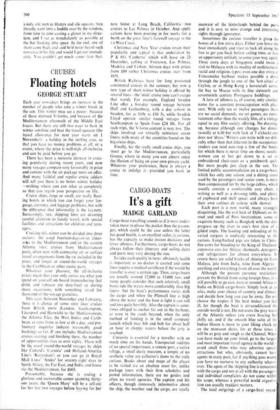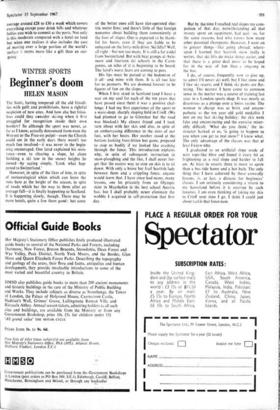It's a gift
CARGO-BOATS MADGE GARLAND
Cargo-boat travelling sounds as if it were under- taken more to please the pocket than the passen- ger, which could be the case unless the latter has good health, is an excellent sailor, is curious, has the capacity to make instant decisions and loves idleness. Furthermore, cargo-boats do not always follow their itinerary and sailing dates and ports may vary during the run.
To take each quality in turn: obviously health is important as no doctor is carried and some lines require a medical certificate if the would-be traveller is over a certain age. Then, cargo-boats are usually around 12,000 to 13,000 tons and many people consider that such relatively small boats ride the waves more comfortably than big liners--but the boat's performance varies with the cargo and when the Plimsoll line is high above the water and the boat is light it can roll and toss quite horribly. Also the captain is some- times obliged to anchor far out in the harbour, or even in the roads beyond, when the only method of landing is in the small company launch which may bib and bob for about half an hour in choppy waters before the jetty is reached.
Curiosity is essential for a traveller with so much time on his hands. Unexpected oddities of no special importance, a remote port, a native village, a small dusty museum, a temple of no aesthetic value are collector's items to the truly curious. Books about and maps of the places to be visited are an absolute must for, unlike package tours with their firm schedules and potted information, there are no guides, and often no travel agencies. The captain and his officers, though immensely informative about the ship, the weather and the cargo, are totally unaware of the hinterlands behind the ports and it is easy to miss strange and interesting sights through ignorance.
Sometimes the curious traveller is gives the bonus of a few extra days. Either you leave the boat immediately and trust to luck all along the line to get you back before sailing time, or lose an opportunity unlikely to come your way again. Three extra days at Singapore could mean a visit to Malacca with its medley of architectural, racial and religious types; even one day extra at Trincomalee harbour makes possible a drive through the jungle to one of the 'lost cities' of Ceylon, or at Hong -Kong a hovercraft across the bay to Macao with its fine sixteenth and seventeenth century Portuguese buildings.
A love of idleness is, of course, only another name for a constant preoccupation with plea- sure. With only ten or twelve passengers there are no social demands, no set games, no enter- tainment other than the weekly film, of a vintage equal to any film society offering. No dressing- up, because although one changes for dinner (usually at 6.30 but with luck at 7 o'clock) one does not 'dress.' Writers can write with no diffi- culty other than that inherent in the occupation: readers can read non-stop a few of the books for which there is never time on shore; needle- women can at last get down to a set of embroidered chair-seats or a patchwork quilt. But most people just sleep in the sun. The limited public accommodation on a cargo-boat, which has only one saloon and a dining room used by the passengers and senior crew, is more than compensated for by the large cabins, which usually contain a comfortable easy chair, a writing as well as a dressing table, and plenty of cupboard and shelf space; and always have their own cabinet de toilette with shower.
Each port is a new world, many strangely disquieting, like the evil heat of Djibouti or the mud and smell of Port Swettenham, some of exquisite beauty such as Bangkok with the slow progress up the river to one's first view of a gilded stupa. The loading and unloading of the varied cargoes is endlessly interesting to the curious. Long-backed pigs are taken to China: fine cows for breeding to the King of Thailand: expensive cars for Africa; chemicals, detergent, and refrigerators for almost everywhere. In return there are solid bricks of shining tin from Malaya, jute from India, wine from Algeria- anything and everything from all over the world.
Although the present currency restriction, prevent the British from using foreign lines, it is still possible to go east, west or around Africa or India on British cargo-boats. Simply look at an atlas, make your choice of country and climate. and decide how long you can be away. Do not choose the tropics if the heat makes you feel ill, for though the boat is air-conditioned the outside world is not. Do not cross the grey waste of the Atlantic unless you crave bracing but chilly air, and if the smooth blue satin of the Indian Ocean is more to your liking check up on the monsoon dates, for at those times it will be as grey and rough as the Channel. When you have made up your mind, go to the largest and most important travel agency in the world— avoid small firms who may advertise special attractions but who, obviously, cannot have agents in every port, for if anything goes wrong you have no recourse to any authority whatso- ever. The agent of the shipping line is concerned with the cargo and not at all with the passengers) and individual complaints do not come within his scope, whereas a powerful world organisa- tion can usually readjust matters.
The total outgoings of a cargo-boat voyage
average around £28 to £30 a week which covers everything except your drink bills and whatever follies you wish to commit at the ports. Not only is this moderate compared with a hotel on land but when one realises it also includes the cost of moving over a large portion of the world's surface it seems more like a gift than an out-































 Previous page
Previous page